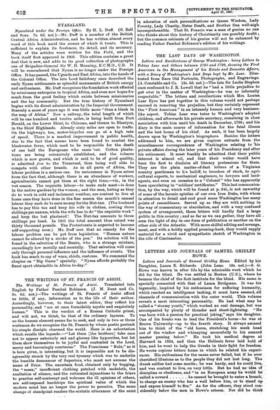THE LAST DAYS OF WASHINGTON.
Letters and Recollections of George Washington : being Letters to Tobias Lear and Others between 1793 and 1799, showing the First American in the Management of his Estate and Domestic Affairs, with a Diary of Washington's Last Days kept by Mr. Lear. Illus- trated from Rare Old Portraits, Photographs, and Engravings. (A. Constable and Co. 12s. ed. net.)—The late Sir Leslie Stephen once confessed to J. R. Lowell that he " had a little prejudice to get over in the matter of Washington—he was so infernally respectable." The letters and recollections which Mrs. Louisa Lear Eyre has put together in this volume would not perhaps succeed in removing the prejudice, but they certainly represent the " First American " in an intensely human and very business- like aspect. Tobias Lear was tutor to Washington's adopted children, and afterwards his private secretary, remaining in close association with him until his death in December, 1799; and his diary is the main source of information for the fatal illness and the last hours of his chief. As such, it has been largely drawn upon by Washington's biographers. Besides the letters addressed to him, we are given copious extracts from the miscellaneous correspondence of Washington relating to 'hie private affairs during the later years of his Presidency and after his retirement. It must frankly be admitted that their public interest is almost nil, and that their writer . would have been the first to disclaim all literary pretensions for them. They are the plain matter-of-fact letters of a Virginian country gentleman to his bailiff, to breeders of stock, to _agri- cultural experts, to mechanical engineers, to lawyers and land- agents, and even on occasion to a "Colonel" who has apparently been speculating in " soldiers' certificates." This last communica- tion, by the way, which will be found at p. 946, is not unworthy of some of the laconic epistles of our own Iron Duke, with whom in attention to detail and cool good sense Washington has many points of resemblance. Served up as they are with nothing in the way of commentary or elucidation, and with a very confused system of arrangement, these letters will hardly find a large public in this country ; and so far as we can gather, they have all seen the light of day in one form of publication or another on the other side of the Atlantic. With more skilful editing and arrange- ment, and with a boldly applied pruning-hook, they would supply material for a vivid and sympathetic sketch of Washington in the rale of Cincinnatus.


























































 Previous page
Previous page